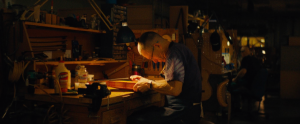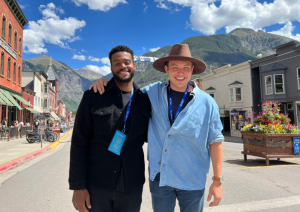We remember music from our youth without realizing it. It’s one of those things that inhabits our brains and psyche no matter how old we get or how much we try to forget it. If you learn how to play music at a young age, it becomes part of your DNA or body makeup, and it continues to thrive the more you rehearse and acquaint yourself with it. An instrument can be your first forever friend, and the bond between you and a violin, flute or piano is a naturally unbreakable one. Ben Proudfoot and Kris Bowers’ harmoniously gentle documentary short, The Last Repair Shop, reflects on how circular and generous the world of creation can be.
It is a film bursting with so much joy. The film debuted at last year’s Telluride Film Festival, and it was just unveiled that the LAUSD Education Foundation has initiated a $15 million campaign to invest in the craftspeople who help continue the musical education of these young people.
Tucked away in Los Angeles is a warehouse of artisans ready to repair the instruments of burgeoning musicians when some TLC is needed. Even if you play an instrument, seeing these people work is fascinating–it’s truly an artform unto itself, and we immediately understand the sense of how precious this work is. In some key shots, these craftspeople sit in the dark to allow light to show an instrument’s injury, and the warmth envelops us as if the instruments themselves glow.
“Our cinematographer, David Feeney-Mosier, has worked with both Kris and I separately on other projects and together on this one,” Proudfoot says. “One of the first things that we witnessed that clued us into the visual language of the movie is that light that they put down into a wood instrument with a leak. There is something so beautiful about that golden glow. In order to see that, you have to turn off the lights, and you get these pods of warm, incandescent workshops–these Geppetto pods. They became a huge part of the visual storytelling–this caramelized glow. The building where they work is literally a warehouse, and there are no windows, so it was primed for that kind of cinematography. When you bring that anamorphic lens up close, magic begins to happen.”

Bowers, an Emmy Award-winning composer, has scored across many genres including Origin, Chevalier, Bad Hair, and Bridgerton, and I couldn’t help but wonder what questions these young people would have for such a notable musician. I could tell that Bowers could get lost in the enthusiasm of the kids while having such respect for the people who tend to ailing instruments. It hints at that circular nature that I felt naturally.
“I was very curious if they had the same kind of relationship with their instrument in the same way that I share a connection with the piano,” Bowers says. “That was even true for someone as young as Porche [Brinker] who loves the violin so much. It’s not contrived at all–there’s such a connection there. Continuing to ask question in terms of talking about their instruments was impressive. Amanda was concerned about her future and where she would fit in in the world, and I remember us talking about how she feels on the stage. She talks in the film about having this power when she’s up there. I was blown away by the difference in the person speaking with me about it who felt a little timid or shy but then she delivered this major sound when she is playing her instrument. If you met her first as she plays the piano, you would assume she is the most confident person you’ve ever met. A lot of it was talking to them like talking to a peer. I felt so aligned with them in my feelings of playing the piano and music. It felt like getting to know another friend who has the same connection. I was so appreciative about not just learning what their instrument means to them but we talked a lot about their personal lives and what they were moving through.”
“We went to the nominees luncheon with Porche, and in this interview at the end she is talking about opening with a D note and then ends with pizzicato,” Proudfoot adds. “I told her that at the beginning of this whole process I was probably sure she didn’t know was pizzicato was. It’s nothing that we did. We are watching this young person learn and grow as part of her musical journey, and it’s so nice to be around people who are devouring everything they can about music. Porche will get every piece of information she can about the violin. She is so insatiably curious about music. We were all getting ready at my house yesterday, and she pulled a 300-page book about Broadway off the shelf. It reminded me of what it was like as a kid and how the world is your oyster.”
I joked with Bowers how difficult it would be to not score such a powerfully magnetic project like this, and he immediately started singing the praises of Repair’s composer Katya Richardson (you can find our interview here). Bowers wanted to ensure that he could direct with Proudfoot every step of the way.
“I think it was more about having someone else’s eyes on it, and I wanted to make sure I could share as much time in the editing room with Ben,” Bowers says. “It would be such a tall order to score this film. For us, it was about being able to bring Katya in since Ben and I have been such big fans of her for so long. We knew that she would bring one hundred percent of herself to it. It was a tough choice, but now that I have heard her music, I am not sure how I would’ve done it myself. She is so masterful when it comes to orchestration, and she did such an excellent job in terms of the instrumentation of all of these different people. I couldn’t be happier.”
“Katya is only 26 years old,” Proudfoot says. “Composing, in particular, takes so much time, so right out of the gate we knew we were witnessing a generational talent. We were making a film about the access to music and the diversity of Los Angeles. Katya is a great representation of that for us.”

Whether these directors are speaking to a young tuba player or an experienced piano repairperson, there is a gorgeous curiosity to the relationship between the subject and us, the audience. It’s almost as if Proudfoot and Bowers make us forget that there is a camera there at all, and we are simply making a new friend with every conversation. They have utilized that technique in films together (like A Concerto Is a Conversation) or when Proudfoot directs solo (Mink!, The Queen of Basketball). It’s personal and different with every film. Proudfoot and Bowers are interested in people, and they give them as much space as they need for them to unfurl their story.
“If you are actually curious and you are able to set aside yourself, you can devote yourself to the story,” Proudfoot muses. “As we live our lives, we are stuffing the ribbon of the human experience in this bag. Sometimes there are knots and somethings the ribbon is frayed. We are pulling out together and carefully untying things as knots come up and letting it unfurl. And we give it as many hours as it takes to get it all out on the table so all context is known. Every part of it is expressed as the person wants to express it. One of the greatest things from the digital revolution has given us is the ability to record hours and hours. I would never be able to record eight hours on film. We could record as long as they want to talk to us, if we wanted to. Allowing the breath and the pause to occur allows their story to lead the way.”
“Something that I will say on Ben’s behalf is that he is so great at making people feel comfortable and allowing them to know that they are being trusted and listened to,” Bowers says. “I remember Ben helping me figure out how to have that conversation with my grandfather for Concerto, but, especially with this one, everyone has such a unique story. The filmmaking comes out of the seed of them being honest with whatever happened in their lives. For them to be so open and honest and tell stories from a genuine place and tell stories that aren’t contrived or forced out of them, it speaks to how the interviews are carried out. People are given the space to answer a question or even sit in their silence before they speak. Each film has its own identity, because we are allowed to listen in such a comforting and welcoming space. The person is a seed of how the story gets told rather than coming into an interview with an agenda to get certain stories out of someone.”
The Last Repair Shop is available to stream on Disney+ and Hulu or it can be streamed via The LA Times YouTube page.
















![2025 Oscars: Can a Late-Breaker Still Win Best Picture? [POLL]](https://www.awardsdaily.com/wp-content/uploads/2024/10/gladiator-350x250.jpg)
